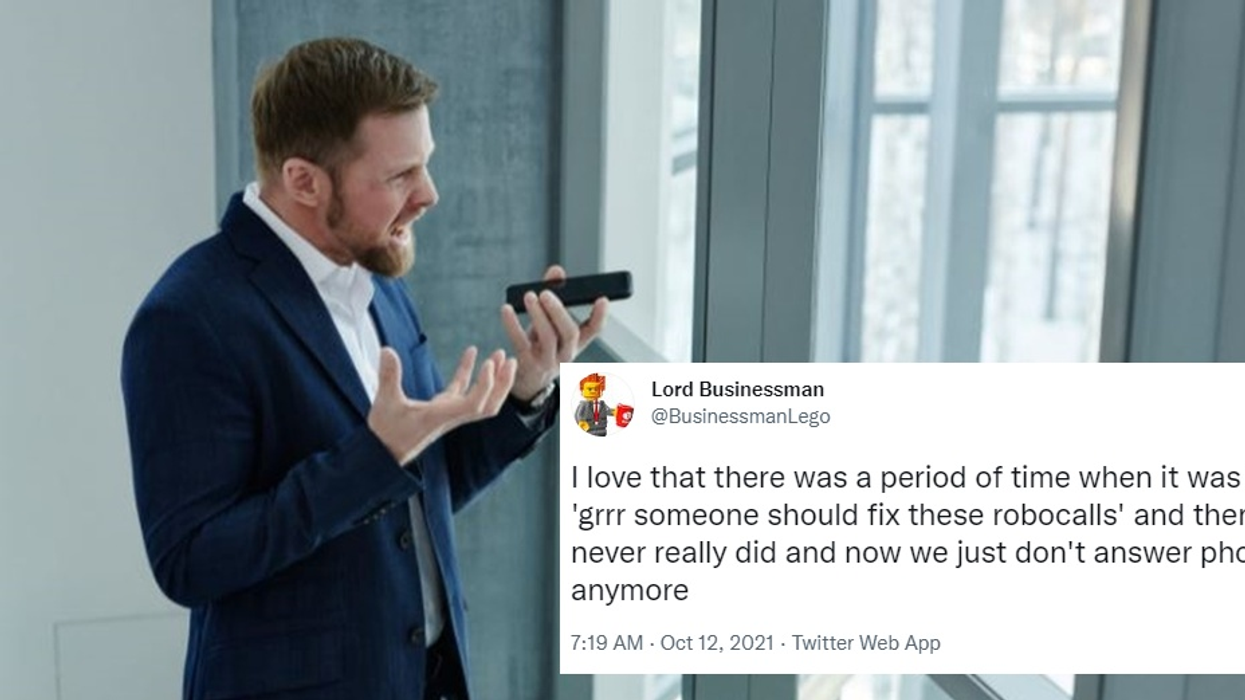
An anonymous Twitter user with the handle BusinessmanLego is getting a lot of love for pointing out a sad fact of American life: The phone call has been nearly killed by scammers.
We can all remember a time when getting a phone call from a number you didn’t know would be exciting. A long-lost friend could be getting in touch. It could be a new opportunity. You may have won the Publishers Clearing House sweepstakes.
But now, a call from an unknown number is most likely from a scammer or an autodialer. They’re distracting, annoying and feel like harassment. The fact that they’ve become so common seems like another example of how so many of our institutions have stopped working in the best interests of the public and have kowtowed to special interests.
I love that there was a period of time when it was like ‘grrr someone should fix these robocalls’ and then they nev… https://t.co/yadzeW6zOl
— Lord Businessman (@BusinessmanLego)
1634048356.0
A lot of people feel that robocalls have basically ruined the concept of the phone call.
Our leaders have failed.
Nobody wants to pick up the phone anymore.
People never used to ignore phone calls.
@behaviorben @BusinessmanLego Ignoring a ringing phone was like ignoring a knock at the door. Hard to believe, now.
— Mortal Trash (@trashymortal)
1634089406.0
It seems like we’ve all sacrificed a great mode of communication and our sanity for a few opportunists to make a buck.
It’s not just calls.
OK, now this was funny.
@JennyBwood @BusinessmanLego Jenny I know your number. It’s 867-5309.
— Jamison Malkovich 🇺🇦🇮🇹🇺🇲🌊🌊🏖️🍺 (@redhorse6531)
1634130736.0
Now, here’s a solution: We could charge people for unsolicited calls.
@google_result @BusinessmanLego This is a great idea and would solve the problem. Wouldn’t even need to be 20c, cou… https://t.co/LDOdHJDWvM
— Jason Harris 💉💉 (@LMCBoy)
1634081353.0
America has been plagued by robocalls over the past few years. The Federal Communications Commission and the Federal Trade Commission identified them as the No. 1 complaint in 2020 and Americans are on track to receive 48 billion this year.
How does this happen?
Robocalls usually begin abroad in counties such as India, the Philippines and Mexico. Scammers route their calls to smaller U.S.-based telecom carriers who are happy to pocket their fees. The calls are then funneled to the largest carriers who send them directly to your phone.
In 2019, Congress passed the Telephone Robocall Abuse Criminal Enforcement and Deterrence (or TRACED) Act but the shadowy audio-dialing industry has been able to keep ahead of the law. Fortune says that blame can also be placed on big businesses for their “tacit support for robocalling” and federal agencies whose “foot-dragging” has allowed scammers to get off scot-free.
What can you do to stop auto-dialers?
1. Talk to your phone company. Most major telecom companies have call-blocking tools that can help shut down scammers on their end.
2. Register your number on the Do Not Call Registry. This won’t stop illegal scammers but it will save you from hearing from bothersome legitimate telemarketers.
3. Block spam calls from your smartphone:
iPhone—iOS 13 has an app called Silence Unknown Callers, which blocks any callers that aren’t in your contact list, you haven’t been in contact with or haven’t texted, and sends them straight to voicemail. Settings > Phone > Silence Unknown Callers
Android—To turn on Block Calls From Unidentified Callers, tap the phone icon on the bottom of your screen. Tap the three dots on the top right of the screen, then: Settings > Blocked Numbers. Enable Block Calls From Unidentified Callers by tapping the toggle switch on the right.
Google Pixel—When you receive a call from any number, tap Screen Call on your home screen and Google Assistant will answer it for you. If the caller responds, you’ll receive a transcript of their response.
